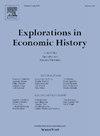奴役生产的美国国民生产总值占南北战争前的比例是多少?
IF 1.7
1区 历史学
Q1 ECONOMICS
引用次数: 0
摘要
这篇文章评估了备受瞩目的说法,即在内战前,被奴役的非裔美国人生产了超过50%的美国国民产品。核算结果显示,这一比例更接近(实际上可能略低于)人口比例,即1860年的12.6%。被奴役人口的劳动力参与率更高,但他们也被迫在农业和家政服务部门工作,每个工人的产出低于平均水平。被奴役者产生的经济盈余主要是由于所提供的非常基本的消费组合的低价值,而不是由于人均生产价值异常高。本文章由计算机程序翻译,如有差异,请以英文原文为准。
What fraction of antebellum US national product did the enslaved produce?
This article evaluates the high-profile claim that enslaved African-Americans produced over 50 percent of US national product in the pre-Civil War period. The accounting exercise shows the fraction was closer to (and indeed likely slightly below) the share of the population, that is, about 12.6 percent in 1860. The enslaved population had higher rates of labor force participation, but they were also forced to work in sectors–agriculture and domestic service—with below average output per worker. The economic surplus generated by the enslaved was due chiefly to the low value of the very basic consumption bundle provided rather than to exceptionally high values of production per capita.
求助全文
通过发布文献求助,成功后即可免费获取论文全文。
去求助
来源期刊

Explorations in Economic History
Multiple-
CiteScore
2.50
自引率
8.70%
发文量
27
期刊介绍:
Explorations in Economic History provides broad coverage of the application of economic analysis to historical episodes. The journal has a tradition of innovative applications of theory and quantitative techniques, and it explores all aspects of economic change, all historical periods, all geographical locations, and all political and social systems. The journal includes papers by economists, economic historians, demographers, geographers, and sociologists. Explorations in Economic History is the only journal where you will find "Essays in Exploration." This unique department alerts economic historians to the potential in a new area of research, surveying the recent literature and then identifying the most promising issues to pursue.
 求助内容:
求助内容: 应助结果提醒方式:
应助结果提醒方式:


